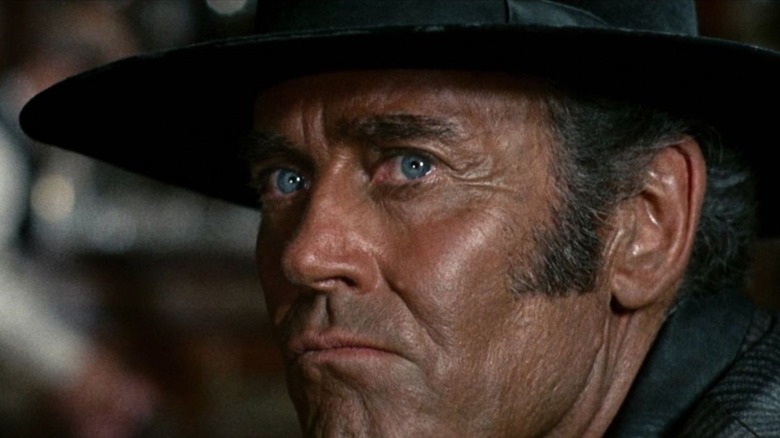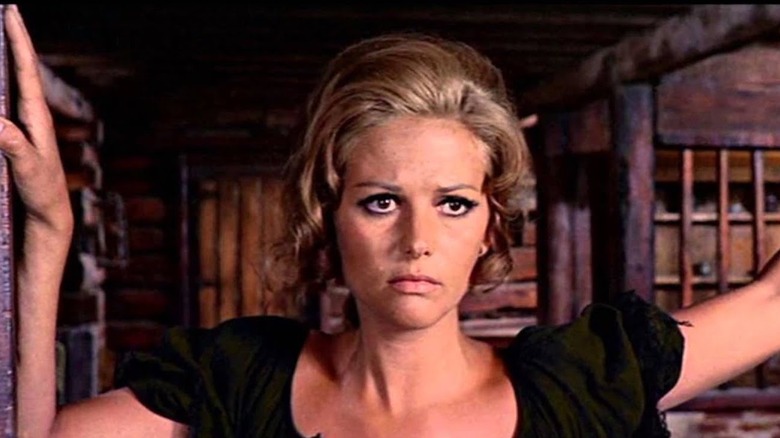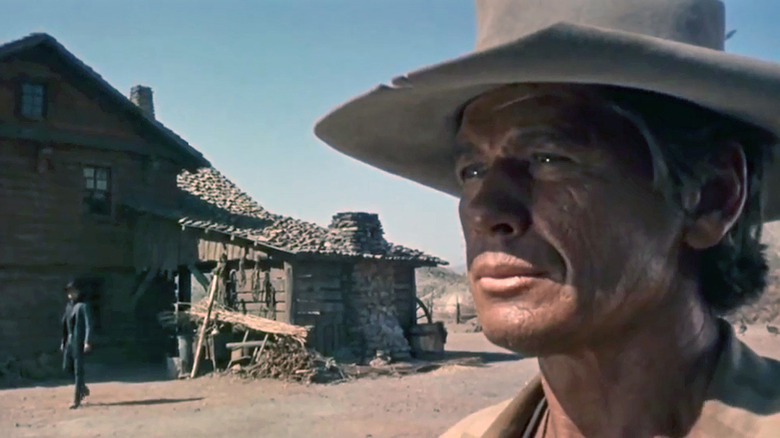Once Upon A Time In The West Was A Twist On The Genre's Greatest Hits
Sergio Leone's "Once Upon a Time in the West" is an elegy for a genre that has died countless deaths. The Western has passed in and out of favor many times since the advent of the motion picture, and is currently ticking anew thanks to Taylor Sheridan's "Yellowstone" franchise. But as the 1970s approached, there was a realization that the stars and filmmakers who'd transformed the oater into the most American of movie genres were on their way out. John Ford had been driven into retirement. John Wayne was dying. Anthony Mann was dead. A glorious, yet complicated era was drawing to a close.
This was the perfect moment for Sergio Leone to go once more to the Western well with a mythic send-off to the films on which he'd built his international reputation. But his scope wasn't limited to "A Fistful of Dollars," "For a Few Dollars More" and "The Good, the Bad and the Ugly." "Once Upon a Time in the West" would be a compendium of references to all the Westerns that shaped Leone's aesthetic – and he was going to be exacting with every tip of the cap. The film is thick with quotations, to the point where even the most seasoned Western fan might struggle to cite them all.
The birth of the meta Western
Leone curiously opted to collaborate with two young writers on the crafting of the story: Dario Argento and Bernardo Bertolucci. You might've heard of them. Both men were as smitten with cinema as Leone, and, perhaps most importantly, were untainted by Italian film studio Cinecittà's factory mindset. Leone told Paramount that he was mounting "a film for myself rather than for the public, a reaction to my previous work." Miraculously, the studio, which was then headed up by the testy Gulf + Western honcho Charlie Bluhdorn, didn't bat an eye. Leone had his greenlight.
Leone was far from the first filmmaker to take a meta approach to the Western. Nicholas Ray's "Johnny Guitar" was a full-scale deconstruction of the genre, revolving around a violent battle of wills between saloon owner Joan Crawford and her bitter rival Mercedes McCambridge. This film gave a brash auteur like Leone license to work wild variations on the genre's stodgy conventions. Interestingly, instead of tweaking the Western as Ray had done, Leone amplified it. His film is every seared-into-your-memory moment from films both classic and underseen writ large.
Leone's narrative isn't complicated. It's a revenge movie set against the westward expansion of the locomotive. Charles Bronson is the mysterious "Harmonica;" Jason Robards' Cheyenne is a wily, less fidgety cousin to Eli Wallach's Tuco from "The Good, the Bad and the Ugly;" and Henry Fonda, renowned for playing upright lawmen like Wyatt Earp in Ford's "My Darling Clementine," is evil incarnate as hired-gun Frank. A love quadrangle forms between the men and Claudia Cardinale's abruptly widowed Jill, but they are all poor suitors. In the end, she has a future, while the men are either dead or, in the case of Harmonica, devoid of purpose and doomed to aimlessly wander the West.
The end of the line
All of these elements were suggested by the film's Western predecessors, and Leone, along with Argento and Bertolucci, cast as wide a net as possible. "The Searchers" is an obvious influence on Frank's massacre of the McBain family prior to Jill's arrival, while "The Iron Horse" looms large in terms of the ruthless rail expansion. But there are stealthier nods to films as diverse as Robert Aldrich's "The Last Sunset" (particularly the final duel) and Delmer Daves' "Jubal." "Winchester '77," "Fort Apache," "Rio Bravo..." it's all in there. The film is a quotation machine, which makes it both a wistful farewell to the old craftsmen of the '30s, '40s and '50s, and a provocation to younger viewers to seek out every film that inspired it.
"Once Upon a Time in the West" stands tall on its own, but the more Westerns you watch, the more epic it becomes. This postmodern style of filmmaking was adopted by the '70s film brats, and turned into text by next-gen video store auteurs like Quentin Tarantino and Edgar Wright, but the timing of Leone's film, and its inimitable, overheated technique, lends it a unique gravity. It is a magnificent eulogy.


